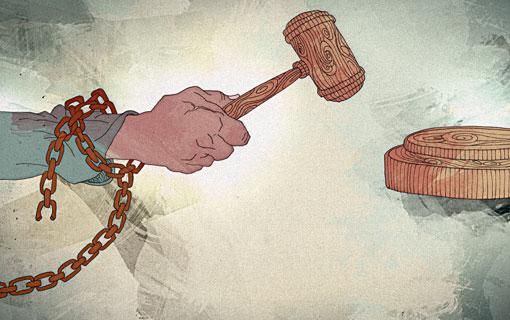There is a saying in Hindi: Der hai, par andher nahin (It is late but not beyond the reach of justice). The wheel of fortune turns ever slowly to expose Narendra Modi, Chief Minister of Gujarat, the state where some 4,000 Muslims were killed seven years ago. It has been widely believed that he and his Bhartiya Janata Party (BJP) members were involved in the pogrom, with the connivance of the state machinery, including the police.
Modi would say in defence: where was the proof? He would also say that what happened in Gujarat was in retaliation to the burning of pilgrims in a train at Godhra, near Ahmedabad. There are too many versions to solely make the Muslims responsible.
Dust has been somewhat cleared by the Supreme Court of India that has asked the Special Investigating Team (SIT) it had appointed last year to probe a complaint against Modi that he and his cabinet colleagues orchestrated the post-Godhara communal riots in 2002 in connivance with police officials and senior bureaucrats.
The complaint filed by advocate Sanjay Parikh on behalf of Jakia Nasim Ahesan Hussain Jafri, the widow of an ex-Congress MP, who was killed by a mob."
SIT is presided over by a retired CBI director, R.K. Raghavan, who enjoys wide respect. His probe, it is conceded, will be fair, just and independent. The BJP is uncomfortable. The Congress is overjoyed for apparent reasons. But the people feel jubilant that the perpetrators of Gujarat may be brought to book.
The state, much less Modi, expected such a turn of events in the investigation. A human rights activist, Teesta Setelvad, who has doggedly pursued the culprits in the Gujarat killings, had submitted a petition on behalf of Jakia. The petition was sought to be filed as a First Information Report (FIR) with the police at Ahmedabad to contend that the killings were pre-planned and that the authorities did little to protect the victims.
The police refused to register the complaint. She went to the court which took little notice of the legal lapse. The matter went up to the Supreme Court where the lawyer appearing on behalf of the Gujarat State said that all the information, whether registered or not, could be sent to the SIT.
It was part bravado. But it has served the purpose of justice. The whole matter, including the unregistered complaints, is before the Raghavan team. Modi is now in the dock. He would have to disprove his involvement before the SIT. Many skeletons are bound to come out of the cupboard. Since the riots, many retired police officials have admitted the involvement of the government.
The immediate reaction of Modi has been that of silence. The BJP's former foreign minister, Yashwant Sinha, in a TV interview, did not react to the Supreme Court's order on the probe, but praised Modi for his developmental works in the state. One cannot expect anything else. The party's youth brigade is at a loss because it has been projecting Modi as the party's prime ministerial candidate after L.K. Advani.
How can they or, for that matter, any sensible person think of Modi at any responsible position when there are charges of his involvement in the killing and the looting of Muslims in Gujarat?
Whatever the BJP's thinking, India is a pluralistic country, however wanting in many ways. The party does not appreciate the secular temperament of the people. But when the upper middle class or the corporate leaders - there was a meeting of top industrialists at Ahmedabad to back Modi - threw to the winds the basic values of pluralism on which India's democratic structure stands, they preferred pelf to principle.
I was the Rajya Sabha member when the Gujarat carnage took place in 2002. It was devastating news. Nobody could find any reason to explain Modi's role. The BJP criticised him in private, but dared not say anything in public lest the party should take disciplinary action. Before Prime Minister Atal Behari Vajpayee visited Ahmedabad for the first time after the carnage, I told him that he should have dismissed Modi straightaway.
After not having done so, I said, he (Vajpayee) should take Modi to task before the public whenever he visited the refugee camps. I felt relieved when Vajpayee did so. He lost temper at many places and admonished Modi.
But the youth brigade of the BJP brainwashed him so much that Vajpayee attacked Islam at a meeting he addressed in Goa.
Till today, the BJP has not apologised for the killings in Gujarat. The Congress Party has behaved a bit better. It has not only apologised for the killing of 3,000 Sikhs in Delhi in 1984, but has also denied party tickets in the Lok Sabha elections to both Jagdish Tytler and Sajjan Kumar, reportedly involved in the riots.
Kuldip Nayar is a former Indian high commissioner to the UK and a former Rajya Sabha member.











